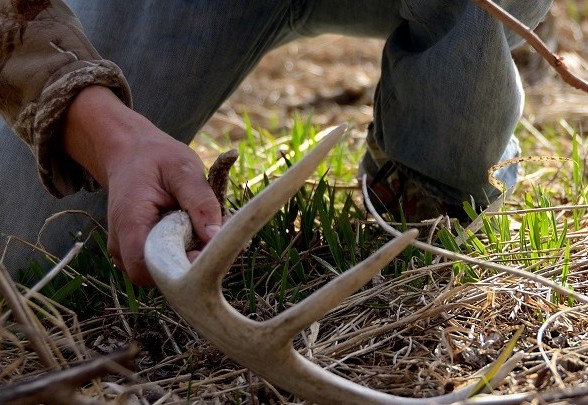Search the feeding areas, search the bedding areas, and search the trails in-between, yadda-yadda-yadda. While I certainly agree with the basics of shed hunting, you can find the same generic shed hunting tips just about anywhere you look. Heck, we even covered them in a recent article because they are important tips, especially for those new to the sport. However, this is not another generic shed hunting article, here you will learn the finer details and skills it takes to become an ultra-successful shed hunter.

Finding a matched set is always the ultimate prize. @colesickafoose found a dandy set in Ohio recently.
1 – Shed hunting is a numbers game
By “numbers game” I mean both number of eyes and number of miles walked. Don’t let shed hunting become a selfish sport. The more eyes you have, the more thorough the search will be, thus the more antlers you are likely to find. Shed hunting with friends and family not only yields more antler, but it’s also a blast! How the antlers are divvied up is usually up to the landowner. If it’s a highly managed property, the antlers are usually given back to the landowner if they want them. On the property I hunt, I let whoever finds them keep them. The only exception would be if I happen to shoot that specific buck during a later season, I would ask for them back.
2 – Slow it down
Slow it way down, to a point that almost feels awkward and lackadaisical. Personally, it’s much easier to slow down when I’m alone. Admittedly so, shed hunting with a group makes me a bit selfish, which I know contradicts the previous tip. I’m not saying I’d rather shed hunt alone than with friends, but sometimes I find myself hastily walking through the woods to beat a buddy to a good looking trail. Side note – I’ve never found a shed by racing ahead to a “good” area. Slow down enough to let your brain process everything you see because in the end you really have no idea where an antler could be laying.
3 – Come to complete stops
When you’re out walking and scanning for sheds, it’s important to come to a complete stop every 50 yards or so. Giving your brain a rest from the back and forth scanning and constant movement is important for staying focused on the task at hand. Finding a shed while standing perfectly still happens more frequently than one may think. While resting, it’s important to look in all directions, especially down at your feet and behind you. A different angle often displays tines that may have been missed.
4 – Spike bucks shed too
It’s hard to think small when all you can envision is massive 5 point side laying tines-up in a bed, but the statistics say otherwise. Simply stated, there are more yearling bucks running around than any other age class that supports head gear. You will have a better chance of spotting both small and big antlers by looking for small pieces or tips poking through a mat of grass or above a leafy surface. Combine this tip with the next and you will be well on your way to becoming a great shed hunter.
5 – Train your eyes
We discussed this in a recent video tip. Training is defined as, to be taught the skills needed to do something. Developing an eye for bone requires practicing with bone. It’s like the real world . . . you can go to school for several years (reading tips) and think you know what you are doing, but the real learning happens on-the-job (actively looking for sheds). Throw out a previously found shed while you’re walking to teach your eyes what to look for, remember to look for the small details.
6 – Optimal weather conditions
Just like deer hunting, there are good days, bad days and great days to shed hunt. The best conditions are cloudy and overcast days following a recent rainfall or snowmelt. Why? Overcast is optimal because you don’t have to fight the sun glaring off every branch or corn stalk on the ground. The dreary day helps those white antlers pop amongst the surrounding vegetation. Looking for sheds right after snowmelt or a recent rainfall helps mat down the vegetation, and the moisture gives the antlers a noticeable sheen.
7 – Situational searching
When you search can have a tremendous effect on your results. Timing your search should be situational to the property or properties you are searching. For example, I’m not going to wait until March to start walking public land or high traffic areas. I’ll target these areas early and often. Compare that to a private property and I’ll likely wait until mid-March to do the majority of shed hunting. Reason being, by mid-March most bucks have dropped their antlers, therefore I don’t want to bump the deer onto the neighbors early on if I know more antlers will be on the ground later.
8 – Search according to the sun
As a “semi-flatlander” here in southeastern Wisconsin, searching south and east facing slopes don’t carry as much weight as they do in much of the whitetails range, but the concept certainly still applies. The reason for searching south and east facing slopes is because that’s where the sun is the warmest and reaches the ground the earliest in the morning, therefore are preferred bedding areas. Applying the earliest and warmest sun concept, search the south and east sides of fallen down trees, cedars, spruce or any type of cover that deer use to bed up against. Just because the landscape is flat doesn’t mean those deer won’t take advantage of warm microhabitats to stay warm. So when you’re out shed hunting be sure to check the south and east sides of any advantageous bedding features.
9 – Label the antlers you find
If you shed hunt a lot, you are bound to end up with a pile of antlers sitting around and it won’t be long before you start forgetting where and when you picked them up. A simple labelling system that includes the date, location and any other important notes is a great way to keep them referenced. I know some people who write right on the antler, some who use masking tape, and others who hang a tag around them. Whatever way you choose, it provides helpful knowledge for future shed hunts and those good ol’ cabin conversations.
10 – Train a dog
Shed hunting dogs are probably the fastest growing and hottest trend amongst the shed hunting community, and rightfully so. They’ve always been recognized for their skills while hunting waterfowl, upland birds, and tracking game, but now they are retrieving antlers for you! It takes some patience and training, but a well-trained pup can find way more antlers than you while covering way more ground. And you thought they couldn’t give you any more reasons to be considered ‘a man’s best friend’.
11– Don’t get discouraged, some people just have a better eye
I absolutely love shed hunting and spend many hours doing it, however, I have buddies who still find more sheds than me every year. Some just have a better eye and some are just able to get out more. It’s embarrassing how many times I’ve been practically stepping on a shed and a buddy comes running up and grabs it. It’s happened once already this year with the first shed of the season. Being an obsessive wildlife manager, I was checking out all the deer sign and the condition of a food plot after a morning coyote hunt. All of a sudden my buddy Josh takes off towards a chocolate brown shed laying on top of the snow ten yards away. You could’ve spotted that thing from outer space, but clearly my mind was elsewhere. Though I may not be the best, I still love to do it and am decently successful.
The bottom line is, you can’t find any by sitting on a couch. Any bad day of shed hunting still beats a day at work or a day spent inside. Remember fellow shedders… MILES = PILES!








